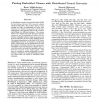Free Online Productivity Tools
i2Speak
i2Symbol
i2OCR
iTex2Img
iWeb2Print
iWeb2Shot
i2Type
iPdf2Split
iPdf2Merge
i2Bopomofo
i2Arabic
i2Style
i2Image
i2PDF
iLatex2Rtf
Sci2ools
114
click to vote
AAAI
1994
1994
Parsing Embedded Clauses with Distributed Neural Networks
A distributed neural network model called SPEC for processing sentences with recursive relative clauses is described. The model is based on separating the tasks of segmenting the input word sequence into clauses, forming the case-role representations, and keeping track of the recursive embeddings into different modules. The system needs to be trained only with the basic sentence constructs, and it generalizes not only to new instances of familiar relative clause structures, but to novel structures as well. SPEC exhibits plausible memory degradation as the depth of the center embeddings increases, its memory is primed by earlier constituents, and its performance is aided by semantic constraints between the constituents. The ability to process structure is largely due to a central executive network that monitors and controls the execution of the entire system. This way, in contrast to earlier subsymbolic systems, parsing is modeled as a controlled high-level process rather than one base...
AAAI 1994 | Distributed Neural Networks | Intelligent Agents | Recursive Relative Clauses | Relative Clause |
Related Content
| Added | 02 Nov 2010 |
| Updated | 02 Nov 2010 |
| Type | Conference |
| Year | 1994 |
| Where | AAAI |
| Authors | Risto Miikkulainen, Dennis Bijwaard |
Comments (0)

